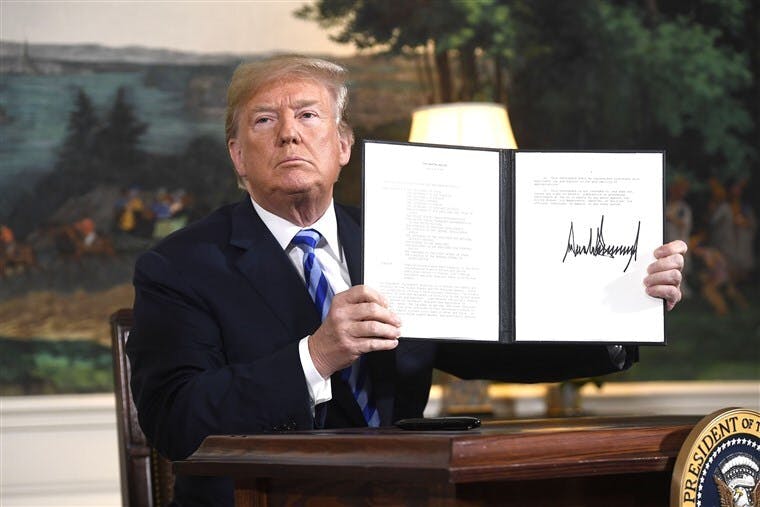Why is the US blockading poor countries in a pandemic?

Imperialism doesn’t stop for pandemics. As cases of COVID-19 multiply across the world, the United States has refused to lift sanctions on Iran and other states and has tightened sanctions on Venezuela.
“The administration is taking a kind of ‘kick them while they’re down’ approach, seemingly with the hope that by piling on sanctions and other actions, the administration can capitalize on the virus in Iran and Venezuela to spur greater public opposition to the incumbent governments and perhaps regime change”, Peter Harrell, a former sanctions official at the US State Department, told the Guardian last month.
Formally, certain essential items – medicine and foodstuffs, for example – are exempt from sanctions on humanitarian grounds. However, bureaucratic delays and the realities of globalised production, combined with outright threats by the United States, mean authorities in affected states are less equipped to deal with the pandemic, which means more unnecessary deaths.
Venezuela’s health system was already at breaking point because of crippling sanctions before the pandemic. It has little ability to carry out mass testing for the virus.
“In Iran, urban administrators are left facing an unprecedented public health crisis”, Tehran mayor Pirouz Hanachi wrote in the Guardian on 4 April. “We are operating against the backdrop of the most extreme sanctions regime in history. The US embargo not only prohibits American companies and individuals from conducting lawful trade with Iranian counterparts, but given that the sanctions are extra-territorial, all other countries and companies are also bullied into refraining from doing legitimate business with Iranians, even the selling of medicines.”
It is virtually impossible for any state to have well-supplied medical facilities without extensive trade with the United States. More pharmaceutical products are produced there than in all other countries combined.
In recent years, Iran has attempted to boost the domestic manufacture of drugs and medical supplies to circumvent sanctions. But in a fully globalised economy, where bits and pieces in the supply chain are shipped from all corners of the earth, there are plentiful barriers to national self-sufficiency.
A 2019 Human Rights Watch report, assessing the impact of sanctions on the Iranian health system, found that a third of medications produced in the country are dependent on imported material. In the complicated processes of mixing drugs, shortages of one ingredient can stop the whole production process.
And importing materials is complicated by impenetrable bureaucracies. For example, the United States provides humanitarian licences for trade with sanctioned countries, which exempt a series of essential items – such as equipped ambulances, institutional washing machines for sterilisation and certain vaccines.
Even getting licences is a lengthy ordeal – and the United States has the final say. In 2016, 50 percent of humanitarian licences were approved for trading with Iran. Currently, less than 10 percent are.
Sanctions don’t only prevent direct trade with the United States. They intimidate other states and corporations from trading with US enemies. This can involve threats of prosecution, scrapping trade deals or extensive and intrusive reporting requirements. The deterrence has clearly worked. Since 2016, Swiss pharmaceutical exports to Iran have fallen by 30 percent, and French exports by 25 percent.
Internally or externally, there is no escape from sanctions. Iran’s depleted health system cannot meet public need at the best of times. It is a tragedy in the face of coronavirus. In response to appeals from the Iranian government to restore trade on medical equipment, secretary of state Mike Pompeo insisted that lifting sanctions “isn’t about fighting the pandemic. It’s about cash for regime leaders”.
Master of spin, the United States points to collapsing economies and social anguish to justify sanctions: look at the state of things, the leaders are inept, they need to fall into line, or go! This logic is most terribly pronounced with regards to Venezuela, a major ideological battering ram for the global right. Venezuela’s empty supermarket shelves, a result of capitalist sanctions, supposedly prove that capitalism is the only system that can efficiently provide for people’s needs.
The US political class is obsessively hawkish towards president Maduro, intent on bringing down his government. It is a vengeful hatred of a now defeated popular movement that defied US imperialism.
Supposedly, sanctions are a form of political pressure to uphold human rights. But as Venezuela runs out of soap and basic medicines, the US government is positively gleeful about the potentially destabilising impact of the coronavirus. James Stavridis, a former US Navy admiral, wrote for Bloomberg on 1 April: “Given all the global attention at the moment on coronavirus – and the devastating effect COVID-19 is likely to have on the Venezuelan people – it might just be possible to put such a package together”, referring to the possible ousting of Maduro.
A better term for “sanctions” is collective punishment. Or, as COVID-19 continues to debilitate the world, mass murder.